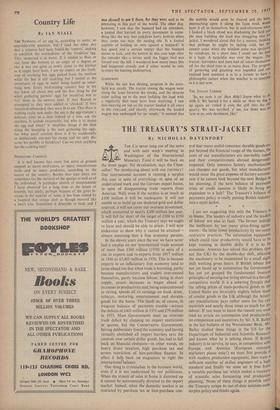THE .TREASURY'S STRAIT-JACKET
By NICHOLAS DAVENPORT
THE £ is never long out of the news and with next week's meeting in lieL Washington of the International Monetary Fund it will be back on the front pages. No devaluation, says the Chan- cellor! No monkeying about with our currency! Our international account is running a surplus this year in spite of everything—in spite of an undervalued mark and the German export boom, in spite of disappointing trade reports from America. Well, even if the surplus is as much as £100 million it will be inadequate. It will not enable us to build up our depleted gold and dollar reserves; it will not cover our overseas investment, which amounted to nearly £200 million last year. It will fall far short of the target of £300 to £350 million a year, which the Treasury says we ought to have and should be able to attain. I will now endeavour to show why it cannot be attained— always assuming that a free economy persists. In the eleven years since the war we have never
had a surplus on our international trade account of more than £300 million (1950) in spite of a rise in exports and re-exports from £917 million in 1946 to £3,403 million in 1956. This is because imports in an inflationary free economy tend to jump ahead too fast when trade is booming, partly because manufacturers and traders over-extend themselves, partly because labour, being in short supply, exacts increases in wages ahead of increases in productivity and, being unaccustomed to saving, spends all its earnings on food, drink, tobacco, motoring, entertainment and durable goods for the home. This lands us, of course, in frequent balance of payments trouble—witness the deficits of £403 million in 1951 and £79 million in 1955. Most . Governments meet an overseas trade deficit by clapping on import restrictions or quotas, but the Conservative Government, having deliberately freed the economy and having virtually abolished all import • barriers save the controls over certain dollar goods, has had to fall back on financial restraints—in other words, on heavy direct taxation, high purchase tax and severe restriction of hire-purchase finance. In effect it falls back on stagnation to right the internationarbalance.
One thing is crystahelear in the business world, even if it is not understood by our politicians. When the stream of sales at home is dammed up it cannot be automatically diverted to the export market. Indeed, when the domestic market is so restricted by purchase tax or hire-purchase con-
trol that many useful consumer durable goods are put beyond the financial range of the masses, the costs of our manufacturers are inevitably raised and their competitiveness abroad dangerouslY impaired. Only intensive factory mechanisation can cheapen our goods, but what manufacturer would incur the great expense of factory automa- tion if he cannot look beyond the next Budget in his planning, if the next balance of payments crisis or credit squeeze is likely to bring his expansion to a halt? The Treasury's balance of payments policy is really putting' British industry into a strait-jacket.
I am not suggesting that only the Treasury is to blame. The leaders of industry and the leaders of labour are also at fault. The former indulge the inefficient by too many price-fixing agree- ments : the latter lower Productivity by too many restrictive practices. The automation equipment which could raise productivity would have to be kept running in double shifts if it is to be economic. America has solved this problem (but not the UK) by the double-day shift, allowing the machinery to be maintained by a small night shift working Seven hours. If British labour has not yet faced up to automation the Government has not yet grasped the fundamental business principles of earning our living abroad in a fiercely competitive world. It is a sobering thought that the selling prices of mass-produced Foods in the United States are invariably slightly below those of similar goods in the UK although the Ameri- can manufacturer pays rather more for his raw materials and nearly three times as 'much for his labour. If you want to know the reason you must read an article on automation and productivity', on competition and incentives, by Mr. S. B. BaileY in the last bulletin of the Westminster Bank. Mr. Bailey studied these things in the US for the Department of Industrial and Scientific Research and knows what he is talking about. If British industry is to survive, he says, in competition with Europe and America (European common marketers please note!) we must first provide it with modern production equipment, then train a sufficient number of skilled engineers of a high standard and finally we must set it free from a variable purchase tax 'which makes a mockery of scientific sales forecasting and production planning,' None of these things is possible until the Treasury scraps its out-of-date taxation-cunr surplus policy and thinks again.






























 Previous page
Previous page